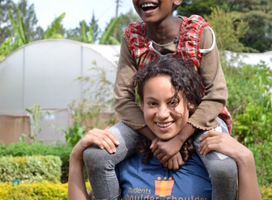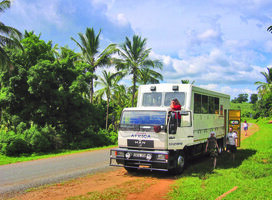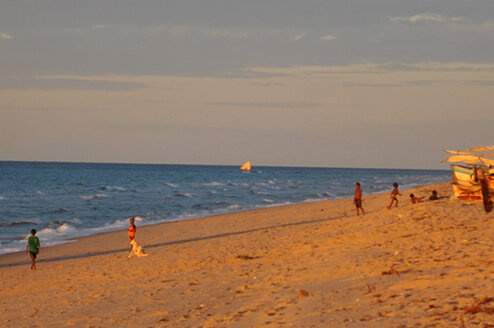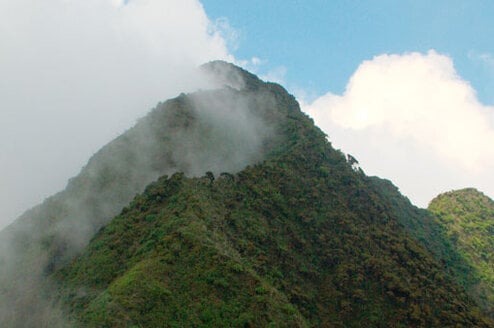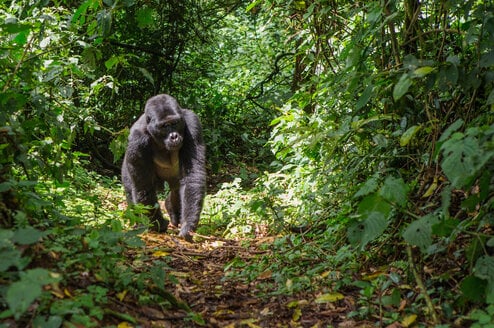High School Abroad in Kenya
Going to Kenya in high school is an opportunity of a lifetime. The country is currently going through some growing changes, tourism is accelerating, and the options for high school abroad programs in Kenya are expanding. Study abroad providers are bringing high schoolers to Kenya to learn Swahili, volunteer, be immersed in Kenya's colorful yet laidback culture, or learn more about its wildlife, archaeology, and development.
If you choose to do high school in Kenya, the country will show you new ways of living that you have never experienced before. You will be able to see how Kenyans live and how their day-to-day lifestyles differ from yours. You will explore different wildlife locations, (hopefully) watch the great migration, or learn more about the where humans originated from. No matter what your focus, be prepared for Kenya to capture your heart.
Kenya is best for students who are natural adventurers, are interested in wildlife conservation, and are service-oriented.
Since Kenya is a developing country, volunteering and service learning is very common for high school students. Although Kenya is the biggest and most advanced economy in east and central Africa, and has an affluent urban minority, as of 2005, 17.7% of Kenyans lived on less than $1.25 a day.
Different types include community service (assisting with teaching English, health awareness, or construction) and wildlife preservation (such as restoring natural areas that have been affected by tourism or climate change). Many students also choose to do this over the summer, opting for 2 to 8 week summer programs.
Some teen travel programs will also take students through Kenya as part of their itinerary.
Popular cities
Nairobi is Kenya’s biggest city as well as the capital. The next largest is Mombasa. While both offer the amenities and attractions of large African cities, you will most likely just travel through them, and spend most of your time in rural areas.
Visa requirements
Nationals of the U.S. and most other western countries will need a visa to enter Kenya, which you will have to apply for online before arrival. Be sure to check with your local embassy or program provider for the most updated requirements for your visa.
Housing
Depending on your program provider, you'll either stay at a homestay or in a dormitory with other students / volunteers.
Costs
Program fees vary but can range from $2,000 and up for a 2 week program. The cost per week often goes down after the first two weeks, however, and staying a bit longer tends to be the most cost effective option.
Keep in mind that housing is typically included in the program fees, as are excursions and food much of the time. For personal expenses, students can get by on $10 - 20 per day in Kenya and a typical meal of ugali and beef only costs about $2. Expect to pay western prices for western goods, however.
Cultural etiquette
Kenya is a fairly conservative country and roughly 70% of the population is Christian. To be respectful while you're there, don't wear overly revealing clothes. Skirts / pants that cover the knees and t-shirts are ideal. Wide-strapped tank tops are OK as well.
If you're greeting an elder or someone of high status, it's considered polite to grasp your right wrist with your left hand when you shake their hand.
If you're staying with a host family, bring a small gift as a gesture of your appreciation -- practical gifts, like t-shirts or food are preferred (though toys for your younger host brothers / sisters will always go over well!). Do not bring gifts / toys / candy / pencils to "hand out to the kids". If you truly want to give donations to people in need in Kenya, consider giving directly to a reputable organization, school, or hospital instead.
Packing tips
You won’t need much while you are in Kenya. Packing simply is best, especially when you might be traveling around the country is just a van or small bus. You will want to bring lightweight clothing that is easily to hand wash (don’t expect to be around washing machines and dryers!) Also make sure to bring some long sleeved shirts and capris/pants to keep mosquitos at bay. Other essentials include:
- A rain jacket
- Warm layers (it gets cold at night in central Kenya)
- A hat
- Sunscreen
- Mosquito repellant
- Trusty and comfortable footwear
- Medications
- A headlamp or flashlight in case of power outages
- Converter
- Kindle
- A good book
- Dry-sacs to keep electronics and papers dry
For electronics, a Kindle or Kindle fire is great because it has a long battery life. Unless you have to do schoolwork, I'd recommend against bringing a laptop. A tablet is a better option if you're just trying to stay in touch with folks back home / watch movies on the plane.
Health
Make sure to visit your doctor at least 4 to 8 weeks before you leave so they can administer the proper vaccinations necessary and obtaining malaria pills. Definitely let them know if you have prior issues with depression or sunburns at that time. Also worth noting, the mosquito that carries malaria is only active at dusk and night -- so don't panic if you get bit at 2pm in the afternoon -- and you should be proactive with mosquito repellant and long-sleeved clothes and pants around this time even if you're taking malaria medication.
The following vaccinations are recommended for Kenya: hepatitis A, hepatitis B, meningococcal meningitis, rabies and typhoid, and boosters for tetanus, diphtheria, polio, and measles. It is also advisable to be vaccinated against yellow fever.
HIV is also prevalent in Kenya so students are advised to practice safe and responsible behavior while there.
You should also never drink tap water unless it has been boiled, filtered, or chemically disinfected (such as with iodine tablets). Also avoid unwashed fruits and veggies, though you shouldn't be afraid to try local food in Kenya. Though heavy, it's delicious, and eating ugali alongside Kenyans is a quick way to make a friend!
Safety
While you should always exercise good judgment in any country that you go to (including your home country) it's best to be aware of what is common in other places too. Kenya’s dangers and annoyances include petty theft and scams, but also larger scale crime and terrorism. While the majority of the country is safe, you should still stay away from the Kenya-Somalia border where large-scale terror issues occur and be extra vigilant in Nairobi.



